Project Management: Understanding Complex Projects Report
VerifiedAdded on 2023/06/07
|8
|1170
|345
Report
AI Summary
This report provides an in-depth analysis of complex project management, drawing on Terry Cooke-Davies' book, 'Aspects of Complexity: Managing Projects in a Complex World'. The report begins with an executive summary and table of contents, followed by an introduction that defines complex projects and their challenges. It then explores the theories and ideas specific to complex project management, including complexity leadership theory, and the balance between administrative and adaptive leadership. The report continues by examining the reasons, environments, and characteristics of complex projects, such as casual ambiguity and uncertainty. It also discusses how project managers can use various tools and techniques, like cognitive approaches and PERT charts, to manage complex projects effectively. The conclusion emphasizes the importance of user-friendly project management software and the distinct nature of each project. The report includes references to support its findings.
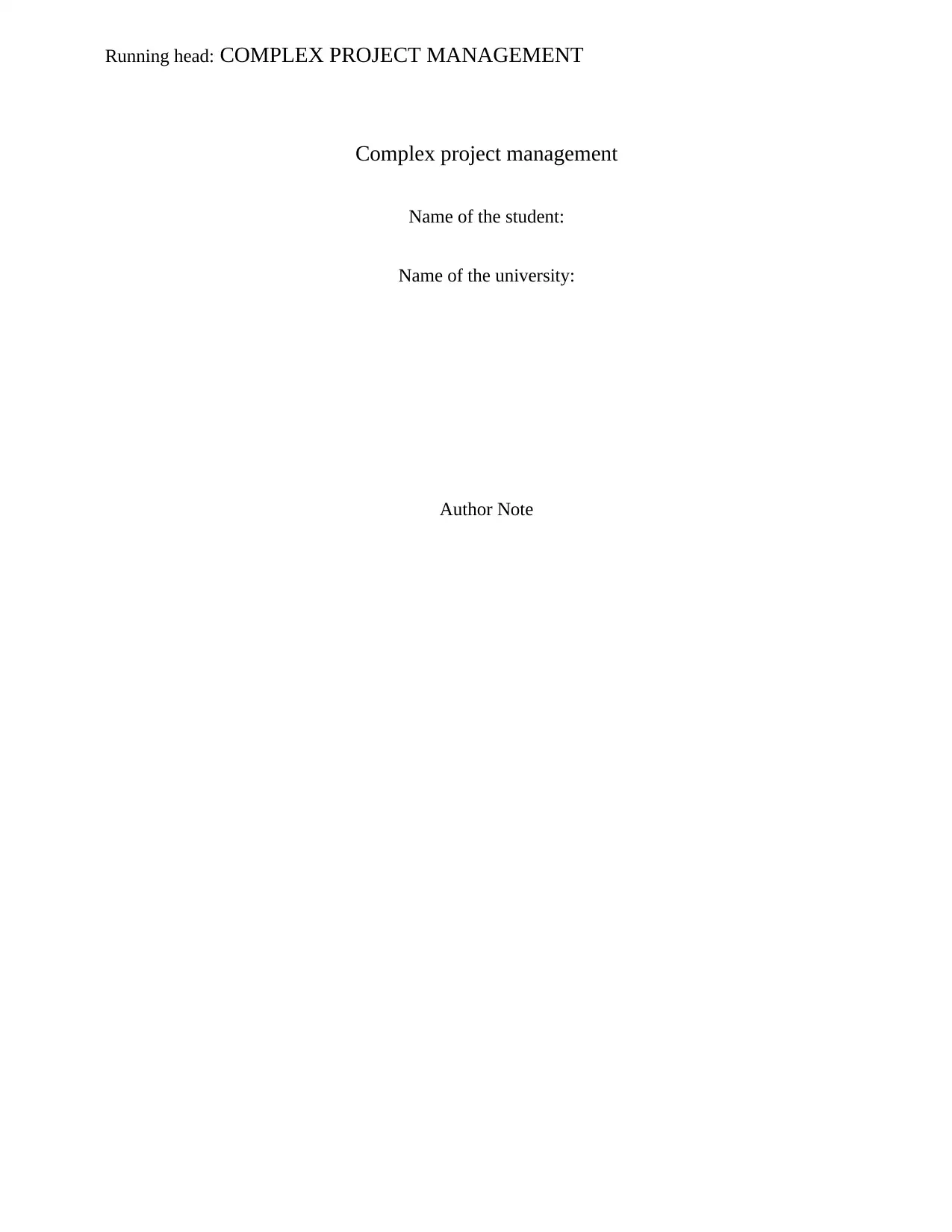
Running head: COMPLEX PROJECT MANAGEMENT
Complex project management
Name of the student:
Name of the university:
Author Note
Complex project management
Name of the student:
Name of the university:
Author Note
Paraphrase This Document
Need a fresh take? Get an instant paraphrase of this document with our AI Paraphraser
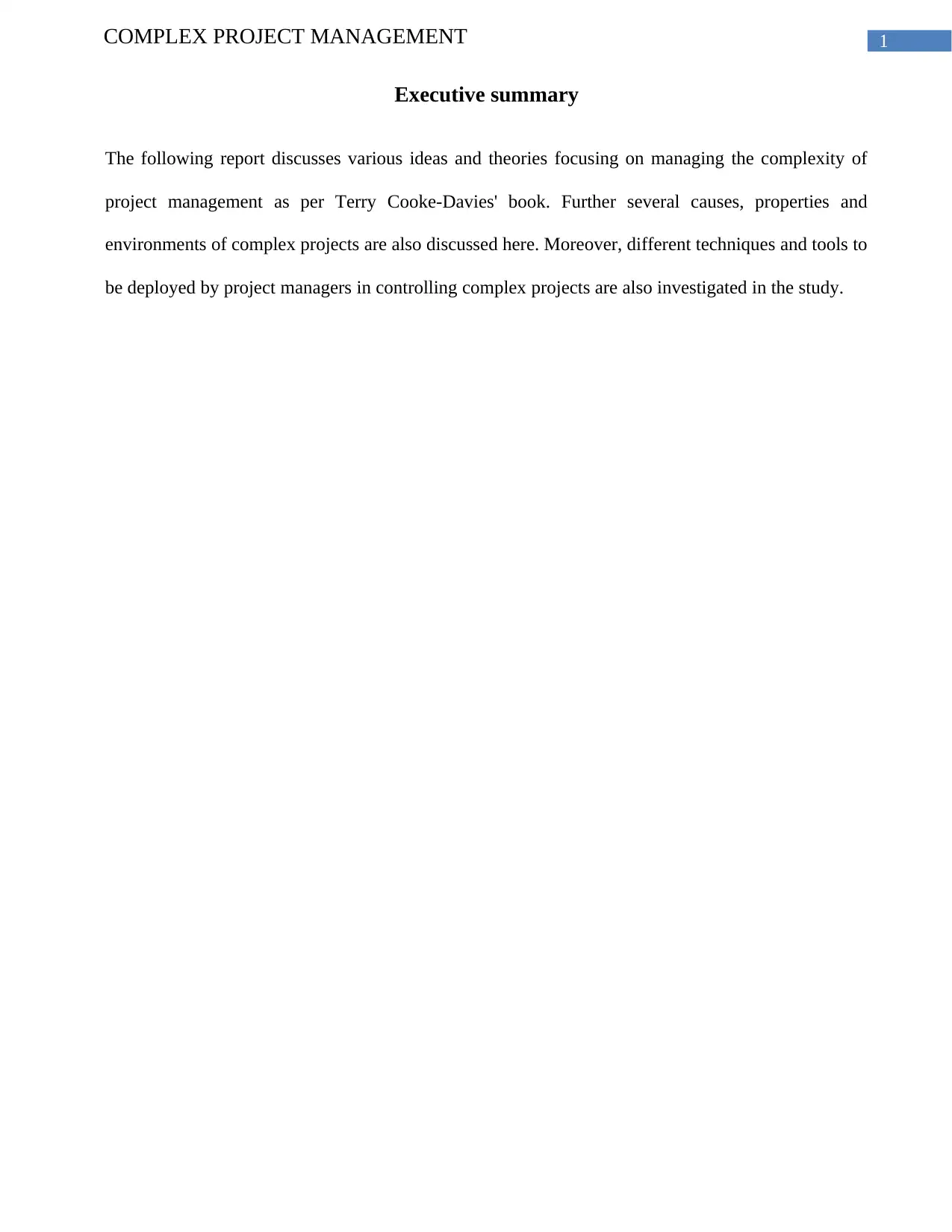
1COMPLEX PROJECT MANAGEMENT
Executive summary
The following report discusses various ideas and theories focusing on managing the complexity of
project management as per Terry Cooke-Davies' book. Further several causes, properties and
environments of complex projects are also discussed here. Moreover, different techniques and tools to
be deployed by project managers in controlling complex projects are also investigated in the study.
Executive summary
The following report discusses various ideas and theories focusing on managing the complexity of
project management as per Terry Cooke-Davies' book. Further several causes, properties and
environments of complex projects are also discussed here. Moreover, different techniques and tools to
be deployed by project managers in controlling complex projects are also investigated in the study.
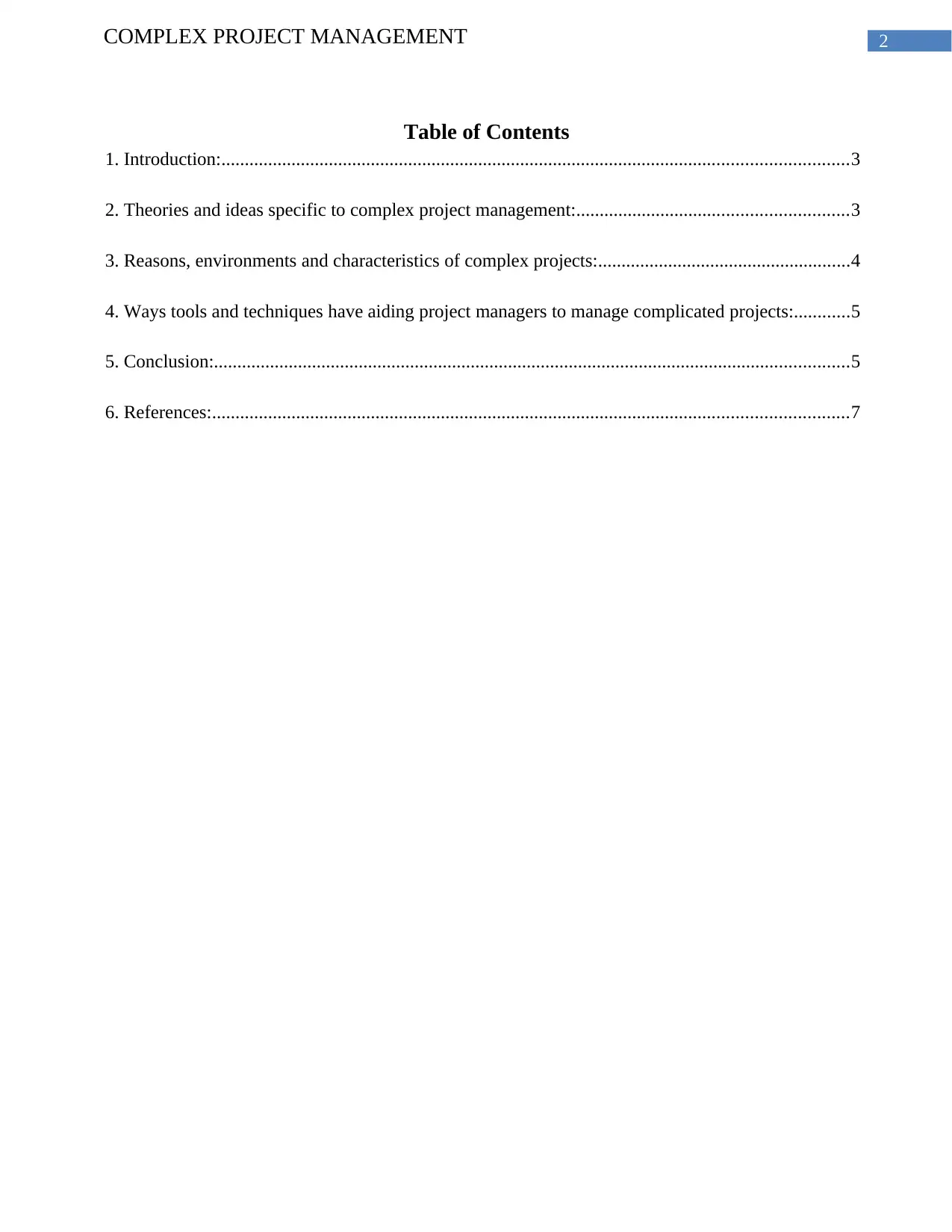
2COMPLEX PROJECT MANAGEMENT
Table of Contents
1. Introduction:......................................................................................................................................3
2. Theories and ideas specific to complex project management:..........................................................3
3. Reasons, environments and characteristics of complex projects:......................................................4
4. Ways tools and techniques have aiding project managers to manage complicated projects:............5
5. Conclusion:........................................................................................................................................5
6. References:........................................................................................................................................7
Table of Contents
1. Introduction:......................................................................................................................................3
2. Theories and ideas specific to complex project management:..........................................................3
3. Reasons, environments and characteristics of complex projects:......................................................4
4. Ways tools and techniques have aiding project managers to manage complicated projects:............5
5. Conclusion:........................................................................................................................................5
6. References:........................................................................................................................................7
⊘ This is a preview!⊘
Do you want full access?
Subscribe today to unlock all pages.

Trusted by 1+ million students worldwide
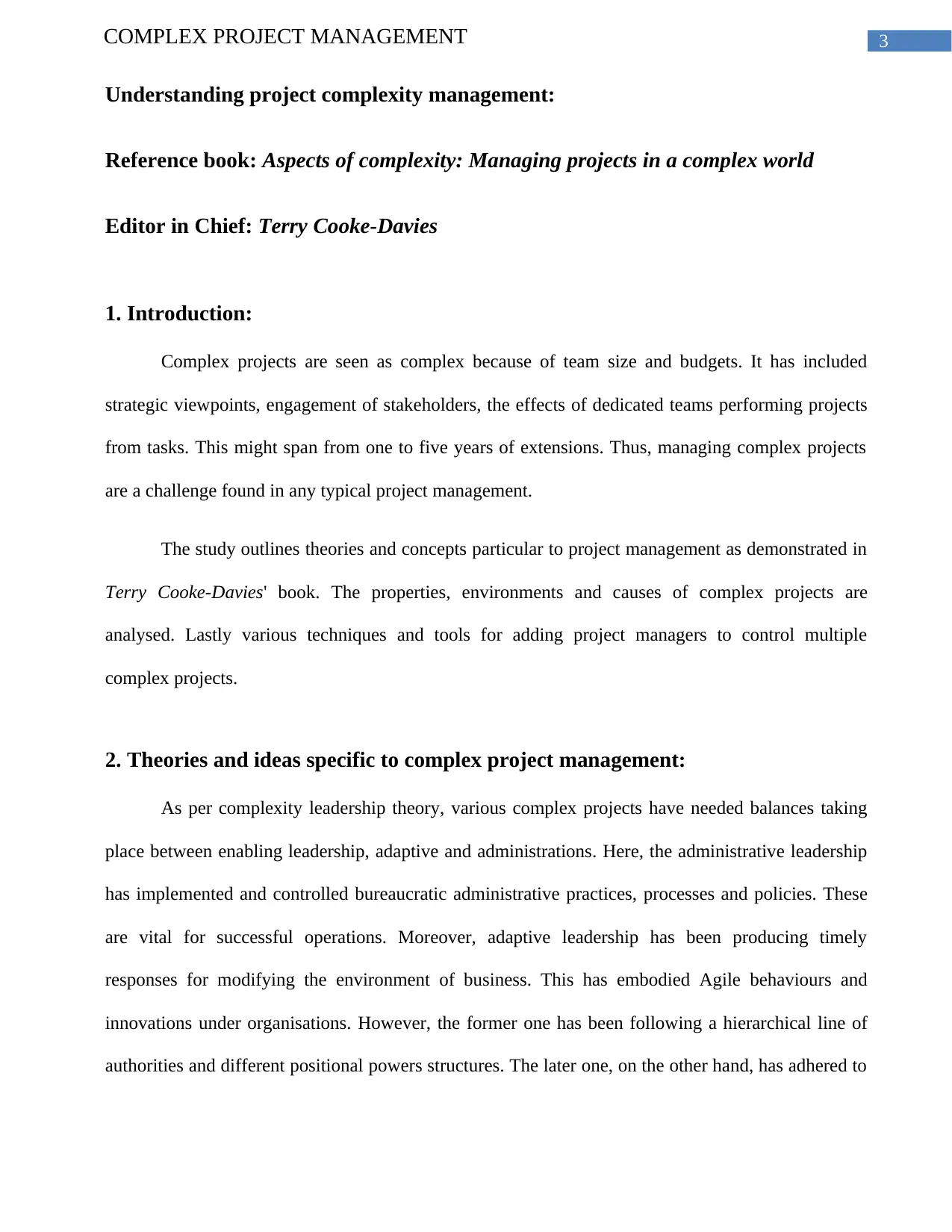
3COMPLEX PROJECT MANAGEMENT
Understanding project complexity management:
Reference book: Aspects of complexity: Managing projects in a complex world
Editor in Chief: Terry Cooke-Davies
1. Introduction:
Complex projects are seen as complex because of team size and budgets. It has included
strategic viewpoints, engagement of stakeholders, the effects of dedicated teams performing projects
from tasks. This might span from one to five years of extensions. Thus, managing complex projects
are a challenge found in any typical project management.
The study outlines theories and concepts particular to project management as demonstrated in
Terry Cooke-Davies' book. The properties, environments and causes of complex projects are
analysed. Lastly various techniques and tools for adding project managers to control multiple
complex projects.
2. Theories and ideas specific to complex project management:
As per complexity leadership theory, various complex projects have needed balances taking
place between enabling leadership, adaptive and administrations. Here, the administrative leadership
has implemented and controlled bureaucratic administrative practices, processes and policies. These
are vital for successful operations. Moreover, adaptive leadership has been producing timely
responses for modifying the environment of business. This has embodied Agile behaviours and
innovations under organisations. However, the former one has been following a hierarchical line of
authorities and different positional powers structures. The later one, on the other hand, has adhered to
Understanding project complexity management:
Reference book: Aspects of complexity: Managing projects in a complex world
Editor in Chief: Terry Cooke-Davies
1. Introduction:
Complex projects are seen as complex because of team size and budgets. It has included
strategic viewpoints, engagement of stakeholders, the effects of dedicated teams performing projects
from tasks. This might span from one to five years of extensions. Thus, managing complex projects
are a challenge found in any typical project management.
The study outlines theories and concepts particular to project management as demonstrated in
Terry Cooke-Davies' book. The properties, environments and causes of complex projects are
analysed. Lastly various techniques and tools for adding project managers to control multiple
complex projects.
2. Theories and ideas specific to complex project management:
As per complexity leadership theory, various complex projects have needed balances taking
place between enabling leadership, adaptive and administrations. Here, the administrative leadership
has implemented and controlled bureaucratic administrative practices, processes and policies. These
are vital for successful operations. Moreover, adaptive leadership has been producing timely
responses for modifying the environment of business. This has embodied Agile behaviours and
innovations under organisations. However, the former one has been following a hierarchical line of
authorities and different positional powers structures. The later one, on the other hand, has adhered to
Paraphrase This Document
Need a fresh take? Get an instant paraphrase of this document with our AI Paraphraser
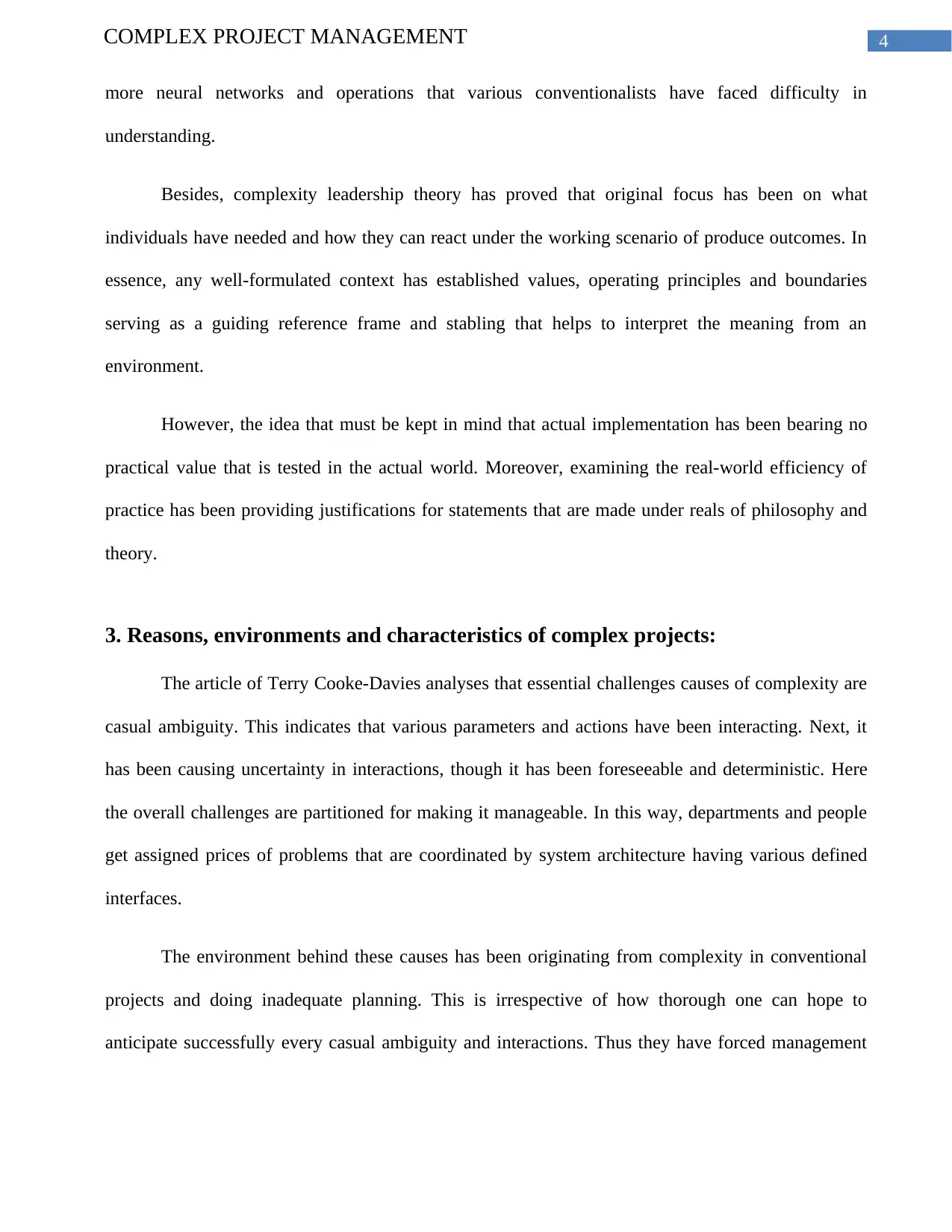
4COMPLEX PROJECT MANAGEMENT
more neural networks and operations that various conventionalists have faced difficulty in
understanding.
Besides, complexity leadership theory has proved that original focus has been on what
individuals have needed and how they can react under the working scenario of produce outcomes. In
essence, any well-formulated context has established values, operating principles and boundaries
serving as a guiding reference frame and stabling that helps to interpret the meaning from an
environment.
However, the idea that must be kept in mind that actual implementation has been bearing no
practical value that is tested in the actual world. Moreover, examining the real-world efficiency of
practice has been providing justifications for statements that are made under reals of philosophy and
theory.
3. Reasons, environments and characteristics of complex projects:
The article of Terry Cooke-Davies analyses that essential challenges causes of complexity are
casual ambiguity. This indicates that various parameters and actions have been interacting. Next, it
has been causing uncertainty in interactions, though it has been foreseeable and deterministic. Here
the overall challenges are partitioned for making it manageable. In this way, departments and people
get assigned prices of problems that are coordinated by system architecture having various defined
interfaces.
The environment behind these causes has been originating from complexity in conventional
projects and doing inadequate planning. This is irrespective of how thorough one can hope to
anticipate successfully every casual ambiguity and interactions. Thus they have forced management
more neural networks and operations that various conventionalists have faced difficulty in
understanding.
Besides, complexity leadership theory has proved that original focus has been on what
individuals have needed and how they can react under the working scenario of produce outcomes. In
essence, any well-formulated context has established values, operating principles and boundaries
serving as a guiding reference frame and stabling that helps to interpret the meaning from an
environment.
However, the idea that must be kept in mind that actual implementation has been bearing no
practical value that is tested in the actual world. Moreover, examining the real-world efficiency of
practice has been providing justifications for statements that are made under reals of philosophy and
theory.
3. Reasons, environments and characteristics of complex projects:
The article of Terry Cooke-Davies analyses that essential challenges causes of complexity are
casual ambiguity. This indicates that various parameters and actions have been interacting. Next, it
has been causing uncertainty in interactions, though it has been foreseeable and deterministic. Here
the overall challenges are partitioned for making it manageable. In this way, departments and people
get assigned prices of problems that are coordinated by system architecture having various defined
interfaces.
The environment behind these causes has been originating from complexity in conventional
projects and doing inadequate planning. This is irrespective of how thorough one can hope to
anticipate successfully every casual ambiguity and interactions. Thus they have forced management
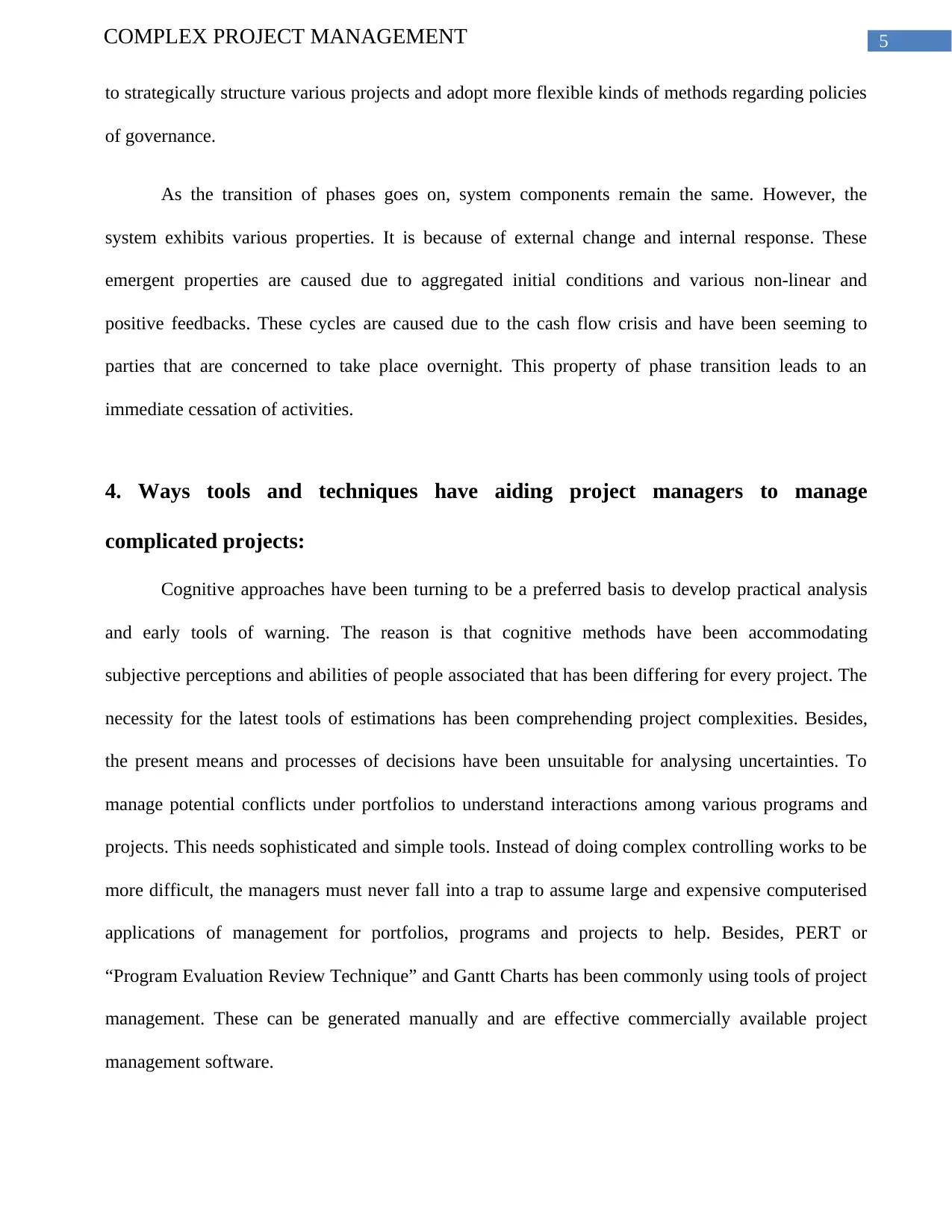
5COMPLEX PROJECT MANAGEMENT
to strategically structure various projects and adopt more flexible kinds of methods regarding policies
of governance.
As the transition of phases goes on, system components remain the same. However, the
system exhibits various properties. It is because of external change and internal response. These
emergent properties are caused due to aggregated initial conditions and various non-linear and
positive feedbacks. These cycles are caused due to the cash flow crisis and have been seeming to
parties that are concerned to take place overnight. This property of phase transition leads to an
immediate cessation of activities.
4. Ways tools and techniques have aiding project managers to manage
complicated projects:
Cognitive approaches have been turning to be a preferred basis to develop practical analysis
and early tools of warning. The reason is that cognitive methods have been accommodating
subjective perceptions and abilities of people associated that has been differing for every project. The
necessity for the latest tools of estimations has been comprehending project complexities. Besides,
the present means and processes of decisions have been unsuitable for analysing uncertainties. To
manage potential conflicts under portfolios to understand interactions among various programs and
projects. This needs sophisticated and simple tools. Instead of doing complex controlling works to be
more difficult, the managers must never fall into a trap to assume large and expensive computerised
applications of management for portfolios, programs and projects to help. Besides, PERT or
“Program Evaluation Review Technique” and Gantt Charts has been commonly using tools of project
management. These can be generated manually and are effective commercially available project
management software.
to strategically structure various projects and adopt more flexible kinds of methods regarding policies
of governance.
As the transition of phases goes on, system components remain the same. However, the
system exhibits various properties. It is because of external change and internal response. These
emergent properties are caused due to aggregated initial conditions and various non-linear and
positive feedbacks. These cycles are caused due to the cash flow crisis and have been seeming to
parties that are concerned to take place overnight. This property of phase transition leads to an
immediate cessation of activities.
4. Ways tools and techniques have aiding project managers to manage
complicated projects:
Cognitive approaches have been turning to be a preferred basis to develop practical analysis
and early tools of warning. The reason is that cognitive methods have been accommodating
subjective perceptions and abilities of people associated that has been differing for every project. The
necessity for the latest tools of estimations has been comprehending project complexities. Besides,
the present means and processes of decisions have been unsuitable for analysing uncertainties. To
manage potential conflicts under portfolios to understand interactions among various programs and
projects. This needs sophisticated and simple tools. Instead of doing complex controlling works to be
more difficult, the managers must never fall into a trap to assume large and expensive computerised
applications of management for portfolios, programs and projects to help. Besides, PERT or
“Program Evaluation Review Technique” and Gantt Charts has been commonly using tools of project
management. These can be generated manually and are effective commercially available project
management software.
⊘ This is a preview!⊘
Do you want full access?
Subscribe today to unlock all pages.

Trusted by 1+ million students worldwide
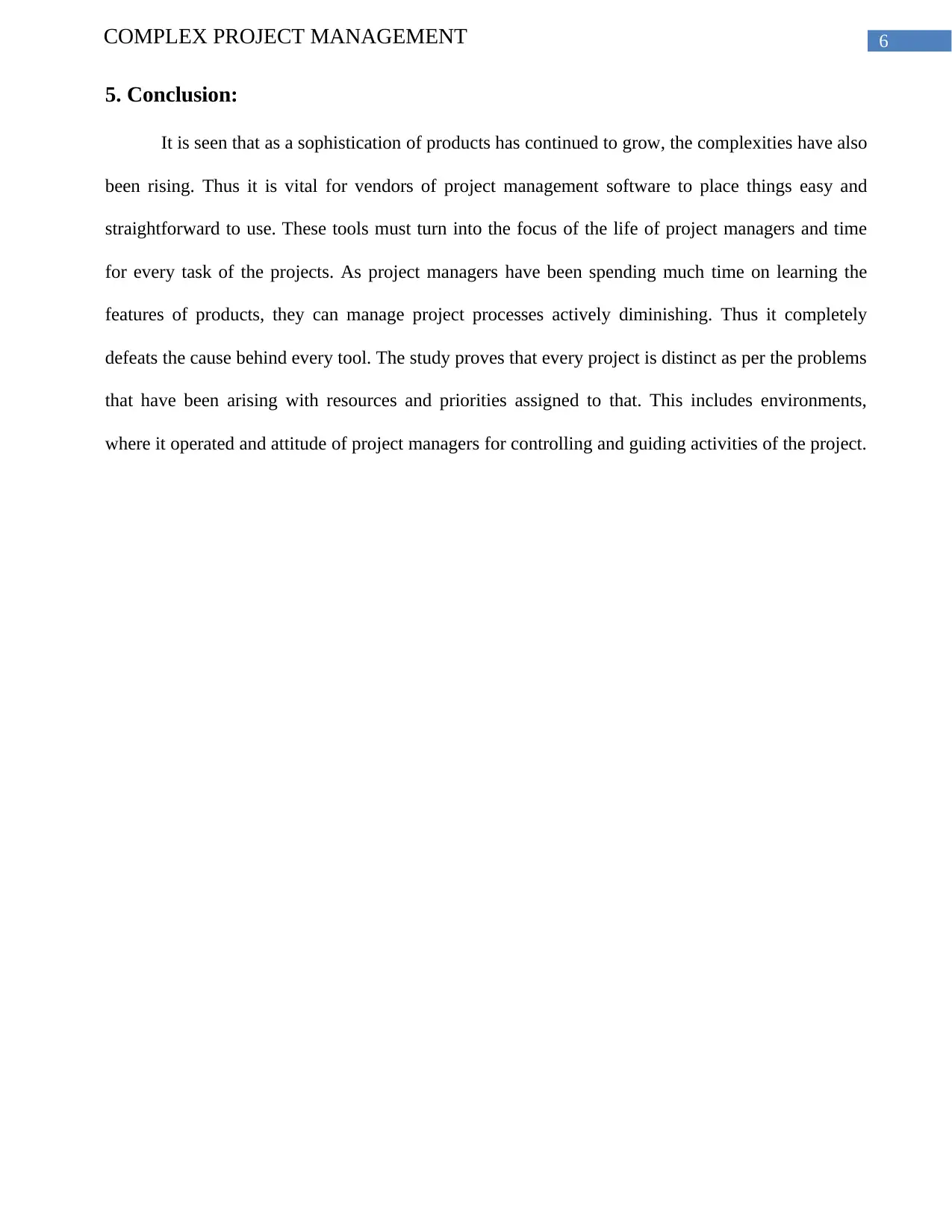
6COMPLEX PROJECT MANAGEMENT
5. Conclusion:
It is seen that as a sophistication of products has continued to grow, the complexities have also
been rising. Thus it is vital for vendors of project management software to place things easy and
straightforward to use. These tools must turn into the focus of the life of project managers and time
for every task of the projects. As project managers have been spending much time on learning the
features of products, they can manage project processes actively diminishing. Thus it completely
defeats the cause behind every tool. The study proves that every project is distinct as per the problems
that have been arising with resources and priorities assigned to that. This includes environments,
where it operated and attitude of project managers for controlling and guiding activities of the project.
5. Conclusion:
It is seen that as a sophistication of products has continued to grow, the complexities have also
been rising. Thus it is vital for vendors of project management software to place things easy and
straightforward to use. These tools must turn into the focus of the life of project managers and time
for every task of the projects. As project managers have been spending much time on learning the
features of products, they can manage project processes actively diminishing. Thus it completely
defeats the cause behind every tool. The study proves that every project is distinct as per the problems
that have been arising with resources and priorities assigned to that. This includes environments,
where it operated and attitude of project managers for controlling and guiding activities of the project.
Paraphrase This Document
Need a fresh take? Get an instant paraphrase of this document with our AI Paraphraser
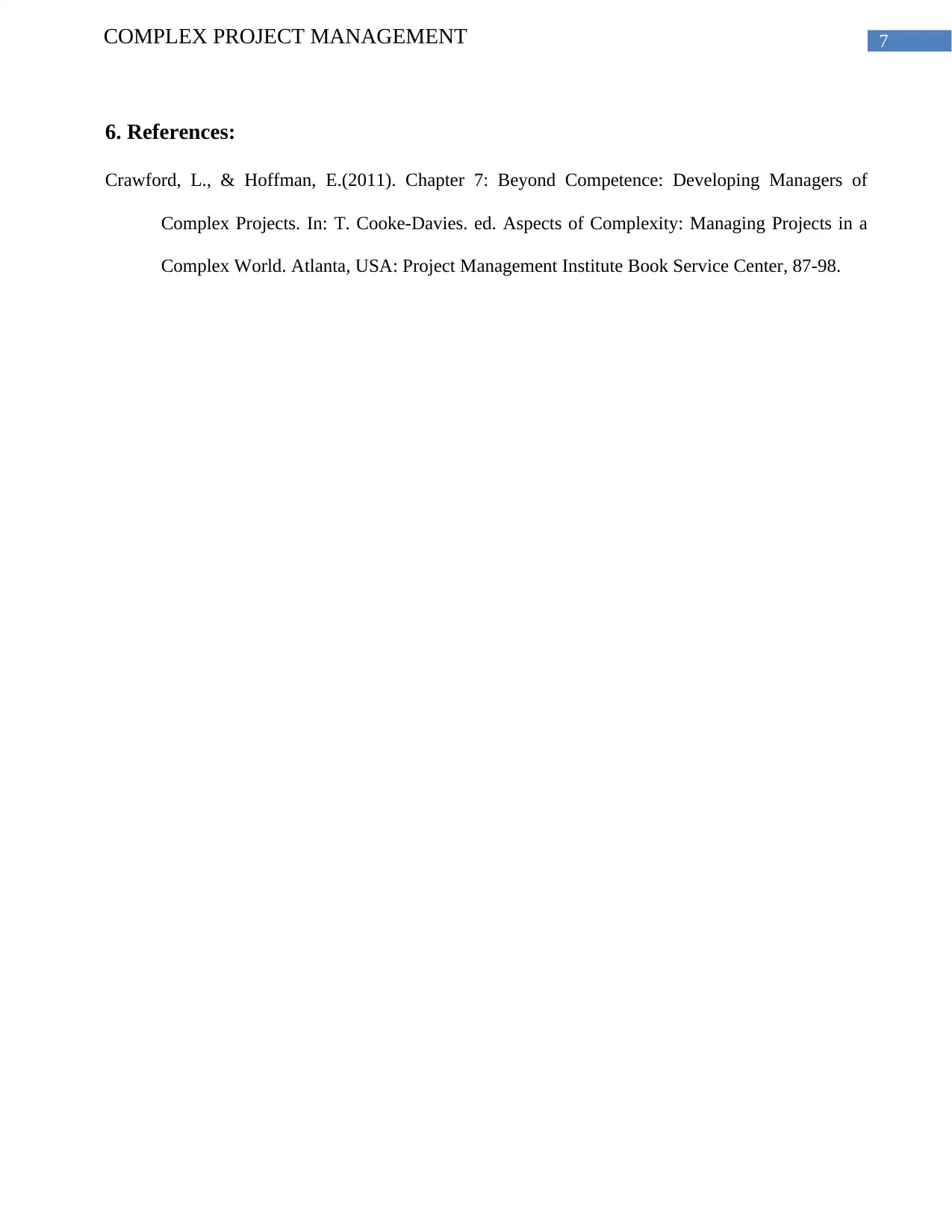
7COMPLEX PROJECT MANAGEMENT
6. References:
Crawford, L., & Hoffman, E.(2011). Chapter 7: Beyond Competence: Developing Managers of
Complex Projects. In: T. Cooke-Davies. ed. Aspects of Complexity: Managing Projects in a
Complex World. Atlanta, USA: Project Management Institute Book Service Center, 87-98.
6. References:
Crawford, L., & Hoffman, E.(2011). Chapter 7: Beyond Competence: Developing Managers of
Complex Projects. In: T. Cooke-Davies. ed. Aspects of Complexity: Managing Projects in a
Complex World. Atlanta, USA: Project Management Institute Book Service Center, 87-98.
1 out of 8
Related Documents
Your All-in-One AI-Powered Toolkit for Academic Success.
+13062052269
info@desklib.com
Available 24*7 on WhatsApp / Email
![[object Object]](/_next/static/media/star-bottom.7253800d.svg)
Unlock your academic potential
Copyright © 2020–2026 A2Z Services. All Rights Reserved. Developed and managed by ZUCOL.


